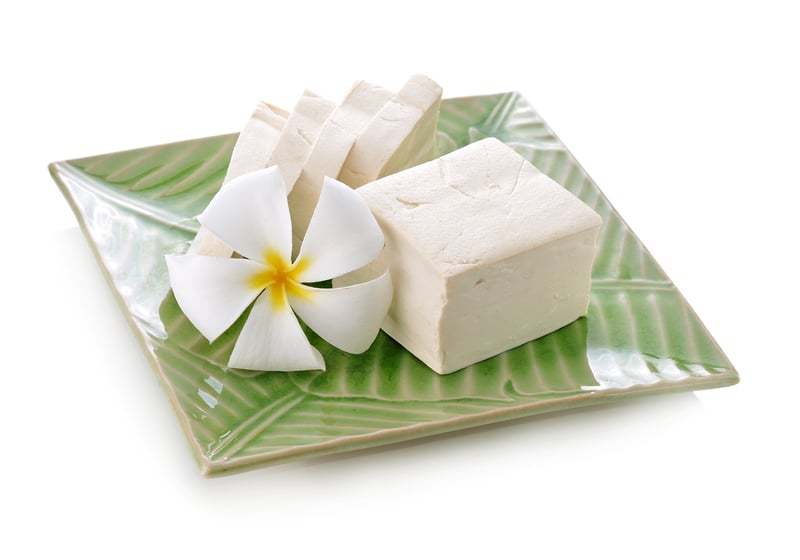Tempeh vs. Tofu: Which Non-Meat Protein Is Healthier?

If you are familiar with plant-based proteins, you are no stranger to tempeh and tofu. Tempeh and tofu are some of the original forms of meat alternatives. And these two plant-based proteins have stood the test of time. Despite new and innovative types of meat alternatives gaining attention, tempeh and tofu remain popular for their versatility and nutrient-density.

Tempeh vs. Tofu: What’s the Difference?
Tempeh is a soy-based product made from fermented soybeans that have been soaked, hulled, cooked, and compacted into a firm, dense patty-like shape. Because tempeh holds its shape, it serves as a great meat substitute. Tempeh is chewy and has a nutty, earthy taste but can still absorb other flavors easily. Most varieties of tempeh also contain quinoa, brown rice, flax seeds, and spices.
Tofu is also a soybean product, but it’s made from condensed, unfermented soy milk that’s been processed into solid white blocks. As a result, tofu has a more neutral flavor and absorbs the taste of the other ingredients paired with it. Tofu can be bought in a variety of types and textures, such as silken or regular.
Silken tofu, also called soft, silk, or Japanese-style tofu, has a softer consistency and a custardy texture since it has the highest water content. Silken tofu can have different consistencies depending on how much soy protein it contains, which are referred to as soft, firm, or extra firm. Silken tofu works well in creamy and blended recipes and can also be used as an egg substitute in baking.
The other, more popular type of tofu is called Chinese-style tofu, bean curd, or regular tofu. This style of tofu is known for its somewhat spongy texture. And it comes in a number of varieties determined by its water content. Soft tofu retains the most moisture as less water is pressed out. Super-firm tofu, on the other hand, has the least moisture content and thus has the most dense texture. As you would expect, the more water removed, the firmer the texture. And as the water content decreases, calories, fat, and protein content increase.
Tempeh vs. Tofu: Nutrition Facts
In the tempeh vs. tofu battle, both have similar nutrient profiles since they are both soy-based products. Both tempeh and tofu are complete sources of protein, meaning they supply all the amino acids your body needs to create muscle, hormones, and antibodies. Both are also generally low in sodium and free of cholesterol. When specifically looking at minerals, they both also contain magnesium and zinc. However, they do have their differences too. Here’s a closer look at one serving (100 grams) of each:
Tofu:
- Protein: 8 grams
- Fat: 5 grams
- Carbohydrates: 2 grams
- Calories: 76
Tempeh:
- Protein: 20 grams
- Fat: 12 grams per 100 g of cooked tempeh
- Carbohydrates: 8 grams
- Calories: 195
At first glance, tempeh may have more calories and fat, but a 100-gram serving is slightly misleading because 100 grams of tempeh will be more filling than 100 grams of tofu due to its high protein and fiber content. Correspondingly, while tofu is lower in protein, it offers significant amounts of iron and potassium and more than double the calcium found in tempeh.
Nevertheless, the most notable nutritional difference between tempeh and tofu come from benefits on gut health. Unlike tofu, the soybeans in tempeh are fermented before being pressed. This makes a probiotic-rich food, delivering around 10 billion CFU of probiotics per gram. Probiotics are beneficial bacteria, which are linked to a plethora of full-body benefits. Additionally, tempeh is also rich in prebiotics because of its high fiber content. Prebiotics are non-digestible fibers that support healthy bacteria growth within the digestive tract.
That said, both tofu and tempeh can be part of a healthy diet. What makes a bigger impact on the healthfulness of the two comes down to how they are prepared and cooked. Either option is a great meat-substitute in any meal; however, flavored tempeh and tofu often have a lot of added sugar and salt.
Aside from the nutritional information, many looking for plant-based protein may be weary of tempeh and tofu due to one major factor—soy.

Should You Be Wary of Soy?
Arguably, soy is one of the most controversial topics when it comes to nutrition. On one hand, it’s rich in nutrients, and diets containing it appear to be linked to health benefits, such as improved heart health and perhaps even a lower risk of certain cancers. On the other hand, some people are concerned about the healthfulness of soy-rich diets, and some wellness practitioners advise their patients to not eat soy due to its estrogen-like effects in the body.
So the next logical question is whether soy is actually good or bad? Well, it depends on who you ask. As a species within the legume family, nutritionists label soy as a food with potential for significant health benefits. However, in certain situations, soy may have potential negative effects, causing some to approach soy with caution. Let’s take a brief look at both sides.
Possible Negative Effects of Soy
One of the major reasons soy is seen as harmful is due to its estrogen-mimicking effects. Soy contains isoflavones, which are often thought to mimic the female reproductive hormone estrogen. Since many breast cancers need estrogen to grow, soy can be believed to potentially raise the risk of breast cancer.
Soy also contains a specific isoflavone called goitrogens, thought to negatively affect the thyroid by blocking iodine absorption. 1 Even more, because soy contains isoflavones, men may worry about how it may negatively impact the production of testosterone.
Another reason some may choose to avoid soy is because soybeans are often genetically modified organisms (GMO). There’s much debate over the safety of GMOs, and their long-term effects in humans still require more scientific studies. However, GMO soy can contain fewer nutrients than conventional or organic soy.
RELATED: Collagen Doesn’t Work (Unless…)
Additionally, like many plant foods, soybeans contain several “antinutrients.” These include trypsin-inhibitors, which block trypsin, an enzyme needed to properly digest protein, and phytates, which can reduce the absorption of minerals, such as calcium, zinc, and iron.
Lastly, some soy compounds could negatively affect digestive health. Soybean agglutinins are a type of antinutrient that have been linked to several negative side effects. According to one review, soybean agglutinins may impact digestion by influencing the structure and barrier function of the gut.
Benefits of Soy Protein
On the other hand, soybeans are naturally rich in protein and contain all the essential amino acids your body needs. They are rich in plant fats, fiber, and several important vitamins, minerals, and beneficial plant compounds.
In addition, soybeans are a natural source of saponins and polyphenols. Saponins are compounds thought to have protective effects on heart health by improving blood cholesterol. 2 Similarly, polyphenols are a type of antioxidant that may help protect your body against cell damage and certain health conditions.
Soy also has beneficial or neutral effect on various health conditions, which actually are the reason for the revolving concern around soy. For instance, although some health professionals advise individuals who have had estrogen-receptor-positive breast cancer to avoid soy due to its isoflavones that have similar structure to estrogen, it does not contain estrogen itself. Even though soy isoflavones are similar in structure to this hormone, soy isoflavones have weaker and slightly different effects than estrogen. 3
In some cases, isoflavones may even offer some protection against certain cancers. 3 – 7 xxOne study in particular showed that for women in western countries, soy intake had no effect on the risk of developing breast cancer. 7 As a result of many like studies, it is actually believed that soy may not increase the risk of breast cancer and may possibly decrease it. The American Cancer Society hence suggests that consuming moderate amounts of soy foods is safe for everyone.
Likewise, another main concern with soy is its impact on thyroid function. Although test-tube and animal studies suggest that some compounds found in soy may reduce thyroid gland function, human studies find little to no negative effects, especially in humans with healthy thyroids. 1, 8-9
Additionally, because soy contains phytoestrogens, men may worry about including it in their diets. However, human studies find a weak link between the two. 3,10 In a review, intake of soy foods, protein powders, or isoflavone supplements did not affect free testosterone or total testosterone levels. 10
Soybeans, like many plants, also contain antinutrients, which may lower the body’s ability to absorb the vitamins and minerals they contain. However, soaking, sprouting, fermenting, and cooking are ways to reduce these antinutrient levels in soy. 11 – 14 Furthermore, some studies suggest the antinutrients in soy may reduce the gut’s barrier function, possibly resulting in digestive issues. 15 – 17 However, as previously mentioned, tempeh specifically contains beneficial prebiotics and probiotics, which may improve gut health.
Tempeh vs Tofu: A Wrap-Up
Overall, soy is a unique food that is widely studied and debated for its effects on the body. Like all things, soy can affect each person differently, and consumption should be based on your own health and body.
Regardless of the additional research needed to reach a definitive conclusion on several points, soy in the form of tempeh or tofu is a nutrient-dense source of protein that serves as an excellent alternative to red and processed meats. While both are healthful options that can be consumed several times a week, tofu may be the best choice for plant-based beginners due to its mild taste, but tempeh leads as the healthier option for its benefits on gut health and heartier taste.





 7 Signs Your Body is Seriously Low on Collagen (not just wrinkles)
7 Signs Your Body is Seriously Low on Collagen (not just wrinkles) Health Expert: "Turmeric Doesn't Work (unless...)"
Health Expert: "Turmeric Doesn't Work (unless...)" 3 Warning Signs Your Probiotic Supplement is a Total Waste
3 Warning Signs Your Probiotic Supplement is a Total Waste

